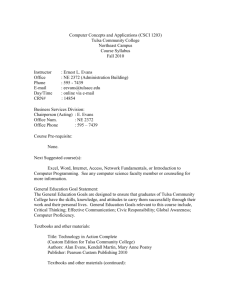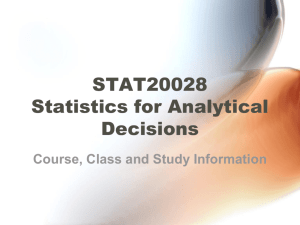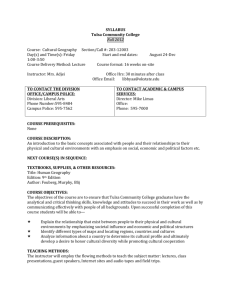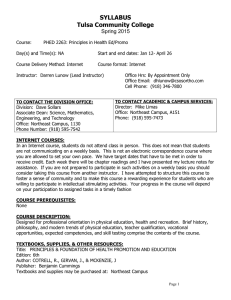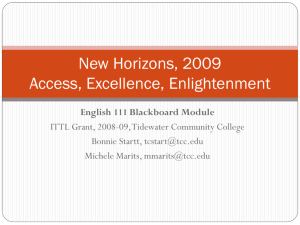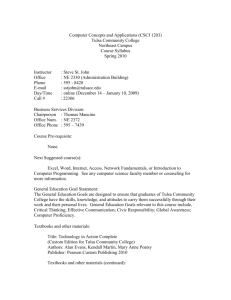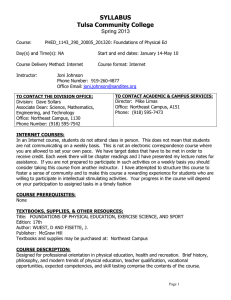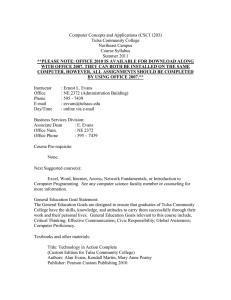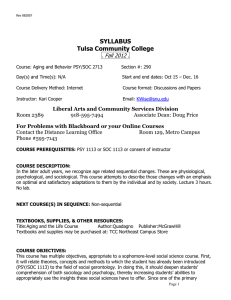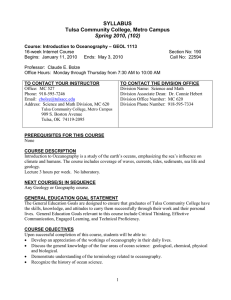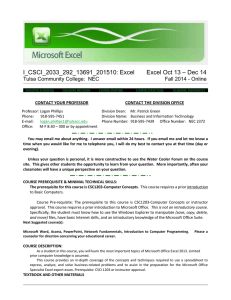CSCI_1203_208_22230_201120
advertisement
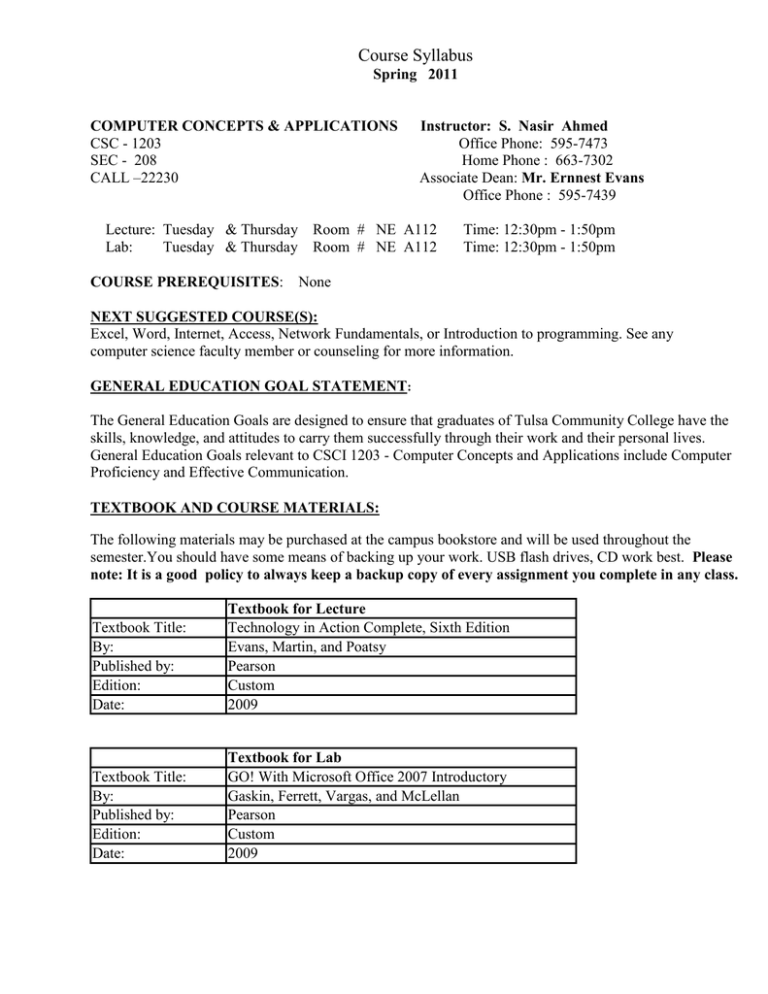
Course Syllabus Spring 2011 COMPUTER CONCEPTS & APPLICATIONS CSC - 1203 SEC - 208 CALL –22230 Instructor: S. Nasir Ahmed Office Phone: 595-7473 Home Phone : 663-7302 Associate Dean: Mr. Ernnest Evans Office Phone : 595-7439 Lecture: Tuesday & Thursday Room # NE A112 Lab: Tuesday & Thursday Room # NE A112 COURSE PREREQUISITES: Time: 12:30pm - 1:50pm Time: 12:30pm - 1:50pm None NEXT SUGGESTED COURSE(S): Excel, Word, Internet, Access, Network Fundamentals, or Introduction to programming. See any computer science faculty member or counseling for more information. GENERAL EDUCATION GOAL STATEMENT: The General Education Goals are designed to ensure that graduates of Tulsa Community College have the skills, knowledge, and attitudes to carry them successfully through their work and their personal lives. General Education Goals relevant to CSCI 1203 - Computer Concepts and Applications include Computer Proficiency and Effective Communication. TEXTBOOK AND COURSE MATERIALS: The following materials may be purchased at the campus bookstore and will be used throughout the semester.You should have some means of backing up your work. USB flash drives, CD work best. Please note: It is a good policy to always keep a backup copy of every assignment you complete in any class. Textbook Title: By: Published by: Edition: Date: Textbook for Lecture Technology in Action Complete, Sixth Edition Evans, Martin, and Poatsy Pearson Custom 2009 Textbook Title: By: Published by: Edition: Date: Textbook for Lab GO! With Microsoft Office 2007 Introductory Gaskin, Ferrett, Vargas, and McLellan Pearson Custom 2009 COURSE DESCRIPTION: The terminology of computers is presented . A major focus will be the concept of “ computer literacy”. The student will do several projects utilizing the major software features of Microsoft Office and the Internet. CATALOG DESCRIPTION: This is a theory /application course. The theory introduces the role of computers in all aspects of global society including security issues. The application segment utilizes Microsoft Windows, Word, Excel, Access, Power Point and the Internet to equip students with basic computer skills necessary for their academic and professional careers. It will serve as the first course to be taken by any computer science major, may satisfy a computer science requirement for another discipline, a university parallel transferable course and meets the computer proficiency requirements mandated by the Oklahoma State Regents for the Higher Education. Lecture 2 hours Laboratory 2 hours. COURSE OBJECTIVE: ** Become familiar with tools for an Information Age. ** Understanding the operating systems, Applications software. ** Understanding central processing unit, input and output. ** Familiarize with word processing, spreadsheets and business graphics. ** Know the components of a computer, storage devices and networking. ** Demonstrate knowledge of database and management information systems. ** General concepts of programming & languages. Discuss security techniques & Privacy. ** Describe career growth opportunities in information systems. ** Understanding and knowledge of the Internet, the basic function of Electronic mail, web page and general concepts for a Office 2007. TEACHING METHODS: This course will consist of a mixture of lab and lecture. There will be Test 1,Test 2 and final examination. Pop quizzes will be given unannounced. NOTE: You are responsible to keep up with the schedule, assignments, and exams. It is the students responsibility to read, understand and retain this syllabus. EVALUATION TECHNIQUES: Grades are based on a percentage of total points accumulated: GRADING SCALE: 90 & above = A 80 - 89 =B 70 - 79 =C 60 - 69 =D 59 & below = F GRADE DETERMINATION: Concepts Chapter Assignments: = 100 pts. Lab Assignments: (10 @ 10pts each) = 100 pts Quiz: (5 @ 20pts each) = 100 pts Test ( 2 Test @ 100pts each) = 200 pts Final Exam = 100 pts Total = 600 pts ATTENDANCE: Class participation is important to be successful in this course. Attendance is not mandatory, However points missed for assignments or quizzes cannot be made up. A borderline grade can be raised with perfect attendance. Makeup exams are at the discretion of the instructor and should be arranged in advance. Pop quizzes cannot be made up. Assignments are due at the beginning of the class on the assigned due date. One letter grade will be deducted for late assignments. WITHDRAWAL FROM THE CLASS: Non- attendance does not constitute withdrawal from the class. The responsibility is yours! TRANSFERABILITY: Please visit with the TCC Counseling Center or the Counseling Center at the college or university to which you plan to transfer to determine transferability status of this course. ADA POLICY: TCC provides accommodations for qualifying students in compliance with the Americans with Disabilities Act. For information, students may contact the disabled Student Resource Center, 918-595-7115, or the Resource Center for the Deaf and Hard of Hearing, 918-595-7428V, 918-595-7434TTY. ACADEMIC INTEGRITY – PLAGIARISM: Academic dishonesty (cheating) is defined as the deception of others about one’s own work or about the work of another. Academic dishonesty or misconduct is not condoned or tolerated at campuses within the Tulsa Community College system. Tulsa Community College adopts a policy delegating certain forms of authority for disciplinary action to the faculty. Such disciplinary actions delegated to the faculty include, but are not limited to, the dismissal of disrespectful or disorderly students from classes. INSTITUTIONAL STATEMENT: Each student is responsible for being aware of the information contained in the TCC catalog. TCC Student Handbook, TCC Student Code of Conduct Policy Handbook, and semester information listed in the Class Schedule. It is the student’s responsibility to withdraw from this course. Check TCC schedule for the last day to withdraw with “AW”. ACADEMIC DISHONESTY: Each Student is expected to complete assignments individually and independently. It is a violation of law to create unauthorized duplicates of copyrighted microcomputer software. Tulsa Community College makes every effort to support these copyright agreements and does not support illegal duplication of any copyrighted materials. COMPUTER SERVICES ACCEPTABLE USE: Access to computing resources is a privilege granted to all TCC faculty, staff, and students. Use of TCC computing resources is limited to purposes related to the College’s mission of education, research, and community service. Student use of technology is governed by the Computer Services Acceptable Use Statements/Standards found in the TCC Student Code of Conduct Policy Handbook. This handbook may be obtained by contacting any Student Activities or Dean of Student Services office. SCHEDULE: Please note: The schedule and procedures in this course are subject to change in the event of extenuating circumstances. ALL assignments and labs are due at the beginning of the Lab Class on the announced due dates. Tentative Agenda Week ------------------- 1/11 - Review Syllabus / Introduction to course 1/13 - Familiarize with lab & equipment. 1/18 - Chapter 1: Why Computers Matter To You 1/20 - Lab 1 Overview windows Vista Project 1 A – Content Based Assessments Matching. 1/25 - Chapter 2: Looking at Computers 1/27 - Lab 2 Word Project 5A and 5B ( Page Word 3 – Word 48). 2/1 2/3 - Chapter 3: Using the Internet - Lab 3 Word Project 5C and 5D ( Page Word 52 – Word 57). 2/8 - Chapter 4: Application Software 2/10 - Lab 4 Word Project 6A and 6B ( Page Word 73 – Word 121). 2/15 - Lab 5 Excel Project 9A and 9B (page Excel 275 – Excel 341). 2/17 - Review for Test 1 2/22 - Test 1 ( Ch- 1,2,3, 4) 2/24 - Lab 6 Excel Project 10A and 10B (page Excel 373 – Excel 417). 3/1 3/3 - Chapter 6: Understanding and Assessing Hardware - Lab 6 Continued… 3/8 - Chapter 7: Networking and Security 3/10 - Lab 7 Access Project 12A and 12B (page Access 521 – Access 571). 3/22 - Chapter 8: Mobile Computing 3/24 - Lab 7 continued…. 3/29 - Review for Test 2 3/31 - Test 2 ( Ch- 6,7,8 ) 4/5 4/7 - Chapter 11: Database and Information Systems - Lab 8 Access Project 13A (page Access 603 – Access 631). 4/12 - Chapter 12: Behind Scenes: Network and Security 4/14 - Lab 9 Power Point Project 15A and 15B (page Power Point 773 – Power Point 813). 4/19 - Chapter 13: Behind Scenes : The Internet 4/21 - Lab 10 Power Point Project 15C and 15D (page Power Point 773 – Power Point 813). 4/26 - All Homework Assignments are due 4/28 - All Lab Assignments are due 5/3 5/5 - Review for Final Exam ( Ch- 11,12,13 ) - Final Exam

